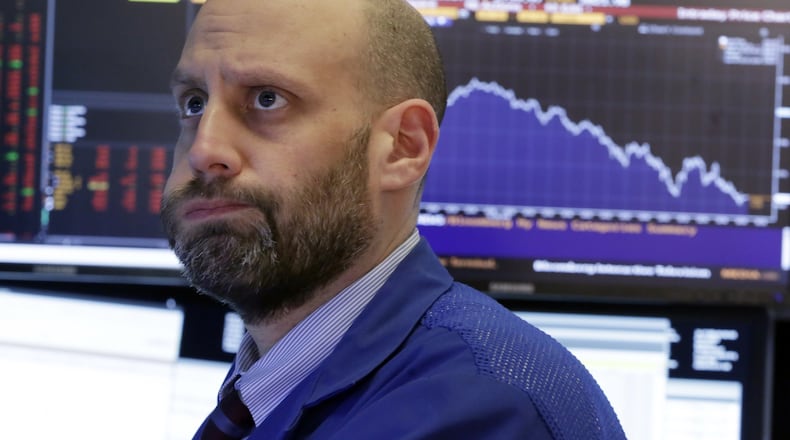Even though Friday’s point drop was scary, the percentage decline wasn’t. At 2.5%, it wasn’t even close to the record, a 22.6% rout on Black Monday in 1987.
“We’ve enjoyed low interest rates for so long, we’re having to deal with a little bit higher rates now, so the market is trying to figure out what that could mean for inflation,” said Darrell Cronk, head of the Wells Fargo Investment Institute.
The sharp decline in stocks last week short-circuited a robust start to the year that was spurred by strong global economic growth, solid company earnings and lingering enthusiasm for the GOP tax overhaul. Even with the pullback, the major indexes are still up more than 3 percent this year.
U.S. employers added a robust 200,000 jobs in January, slightly above market expectations for an 185,000 increase. Meanwhile wages rose sharply, suggesting employers are competing more fiercely for workers. The figures point to an economy on strong footing even in its ninth year of expansion, fueled by global economic growth and healthy consumer spending at home.
That’s good news for Main Street USA, but not for Wall Street. Some economists were predicting Friday that the central bank will raise its benchmark rate four times this year, rather than the three times most previously expected.
The market slide may have been overdue, particularly after the strong start for stocks this year where the S&P 500 had its best January in two decades. Some investors saw a potential buying opportunity.
The global economy is still strong, corporate profits and sales have been better than expected this reporting season and buyers for stocks still remain, all reasons to be optimistic about stocks, said Nate Thooft, senior portfolio manager at Manulife Asset Management.
“It’s appealing, these 2 to 3 percent pullbacks,” said Thooft, who had been trimming some of his stock holdings after the market’s big January gains. “We look at this and say, ‘Maybe it’s your first day to buy a little bit.’”
The stock market isn’t crashing — not yet, anyway. this point, it’s a minor market correction, not a crash. Investors are just not used to seeing corrections lately.
Here are some things to watch today when the market opens:
DON'T FREAK OUT: Some people will panic on Monday and begin selling their stocks. Economists remain bullish on growth in the market and investors say people should not overcorrect because of what happen on Friday. A correction has been predicted for months.
RALLIES START SOON: Market bottoms and the starts of rallies are often within days of each other. Investors Daily reported that 2015 was a prime example. Aug. 24 was the worst day (of the summer downturn). The market lost 4% that day alone. But Aug. 26 was one of the best days. Even if you managed to get out before the 24th, chances are you didn't get back in for the 26th." The price of guessing wrong is that your returns suffer compared with how you would have done if you had simply hung tough. Six of the 10 single best days in the market between Jan. 2, 1996, and Dec. 31, 2015, occurred within two weeks of the worst days, according to J.P. Morgan.
CONSIDER GETTING BACK IN: If the dip continues this week, experts suggest putting money back into the market but be selective. Now is not the time to put all your "eggs in the basket." Consider the long run.
WATCH THE BOND MARKET: The stock market sell-off was tied to a sell-off in bonds, and bond strategists were reluctant to call a direction for interest rates in the week ahead, after the unusual volatility of the past week. Last week, data showing wage growth for hourly workers rose at the fastest pace since 2009 caused a selloff in bonds, pushing the yield on the 10-year Treasury above 2.85%, its highest level in four years. If the climb continues and tops 3%, that could cause more market angst. Higher borrowing costs tend to slow economic activity.
FED CHAIRMAN SWEARING IN: Jerome Powell is sworn in as Fed chair today. Investors said the market is adjusting to the idea that the Fed could have to raise interest rates more than the three times it forecast for this year. There are a number of Fed speakers in the coming week, and they may have comments about inflation but the markets are mostly looking forward to the Fed forecasts after its March meeting and Powell's comments at his first press briefing after that meeting.
The Associated Press contributed to this story.
About the Author

